|
libfoedus-core
FOEDUS Core Library
|
|
libfoedus-core
FOEDUS Core Library
|
Partitioning and sorting logic for one storage. More...
Partitioning and sorting logic for one storage.
When the snapshot module takes snapshot, it instantiates this object for each storage that had some log. Mappers obtain the object and use it to determine which partition to send logs to. Reducers also use it to sort individual logs in the storage by key-then-ordinal order. All methods in this object are in a batched style to avoid overheads per small log entry.
For more details of how individual storage types implement them, see the individual partitioners.
Definition at line 70 of file partitioner.hpp.
#include <partitioner.hpp>
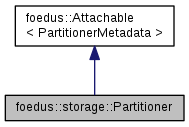
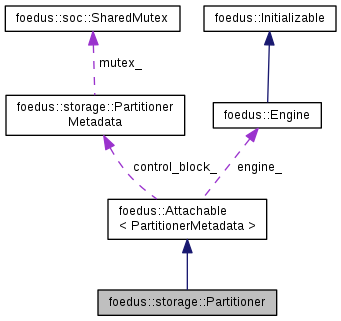
Classes | |
| struct | DesignPartitionArguments |
| Arguments for design_partition() More... | |
| struct | PartitionBatchArguments |
| Arguments for partition_batch() More... | |
| struct | SortBatchArguments |
| Arguments for sort_batch() More... | |
Public Member Functions | |
| Partitioner (Engine *engine, StorageId id) | |
| Instantiate an instance for the given storage. More... | |
| const PartitionerMetadata & | get_metadata () const |
| Returns tiny metadata of the partitioner in shared memory. More... | |
| bool | is_valid () const |
| whether this object is ready for partitioning. More... | |
| StorageId | get_storage_id () const |
| StorageType | get_storage_type () const |
| bool | is_partitionable () |
| returns if this storage is partitionable. More... | |
| ErrorStack | design_partition (const DesignPartitionArguments &args) |
| Determines partitioning scheme for this storage. More... | |
| void | partition_batch (const PartitionBatchArguments &args) |
| Identifies the partition of each log record in a batched fashion. More... | |
| void | sort_batch (const SortBatchArguments &args) |
| Called from log reducer to sort log entries by keys. More... | |
 Public Member Functions inherited from foedus::Attachable< PartitionerMetadata > Public Member Functions inherited from foedus::Attachable< PartitionerMetadata > | |
| Attachable () | |
| Attachable (Engine *engine) | |
| Attachable (Engine *engine, PartitionerMetadata *control_block) | |
| Attachable (PartitionerMetadata *control_block) | |
| Attachable (const Attachable &other) | |
| virtual | ~Attachable () |
| Attachable & | operator= (const Attachable &other) |
| virtual void | attach (PartitionerMetadata *control_block) |
| Attaches to the given shared memory. More... | |
| bool | is_attached () const |
| Returns whether the object has been already attached to some shared memory. More... | |
| PartitionerMetadata * | get_control_block () const |
| Engine * | get_engine () const |
| void | set_engine (Engine *engine) |
Friends | |
| std::ostream & | operator<< (std::ostream &o, const Partitioner &v) |
Additional Inherited Members | |
 Protected Attributes inherited from foedus::Attachable< PartitionerMetadata > Protected Attributes inherited from foedus::Attachable< PartitionerMetadata > | |
| Engine * | engine_ |
| Most attachable object stores an engine pointer (local engine), so we define it here. More... | |
| PartitionerMetadata * | control_block_ |
| The shared data on shared memory that has been initialized in some SOC or master engine. More... | |
Instantiate an instance for the given storage.
| [in] | engine | Engine |
| [in] | id | ID of the storage |
This method only attaches to a shared memory, so it has no cost. You can instantiate Partitioner anywhere you like.
Definition at line 84 of file partitioner.cpp.
References ASSERT_ND, foedus::storage::StorageManager::get_storage(), foedus::Engine::get_storage_manager(), foedus::storage::kInvalidStorage, foedus::storage::StorageControlBlock::meta_, and foedus::storage::Metadata::type_.

| ErrorStack foedus::storage::Partitioner::design_partition | ( | const DesignPartitionArguments & | args | ) |
Determines partitioning scheme for this storage.
This method puts the resulting data in shared memory. This method should be called only once per snapshot.
Definition at line 106 of file partitioner.cpp.
References foedus::storage::sequential::SequentialPartitioner::design_partition(), foedus::storage::hash::HashPartitioner::design_partition(), foedus::storage::array::ArrayPartitioner::design_partition(), foedus::storage::masstree::MasstreePartitioner::design_partition(), foedus::storage::kArrayStorage, foedus::storage::kHashStorage, foedus::storage::kMasstreeStorage, foedus::kRetOk, and foedus::storage::kSequentialStorage.
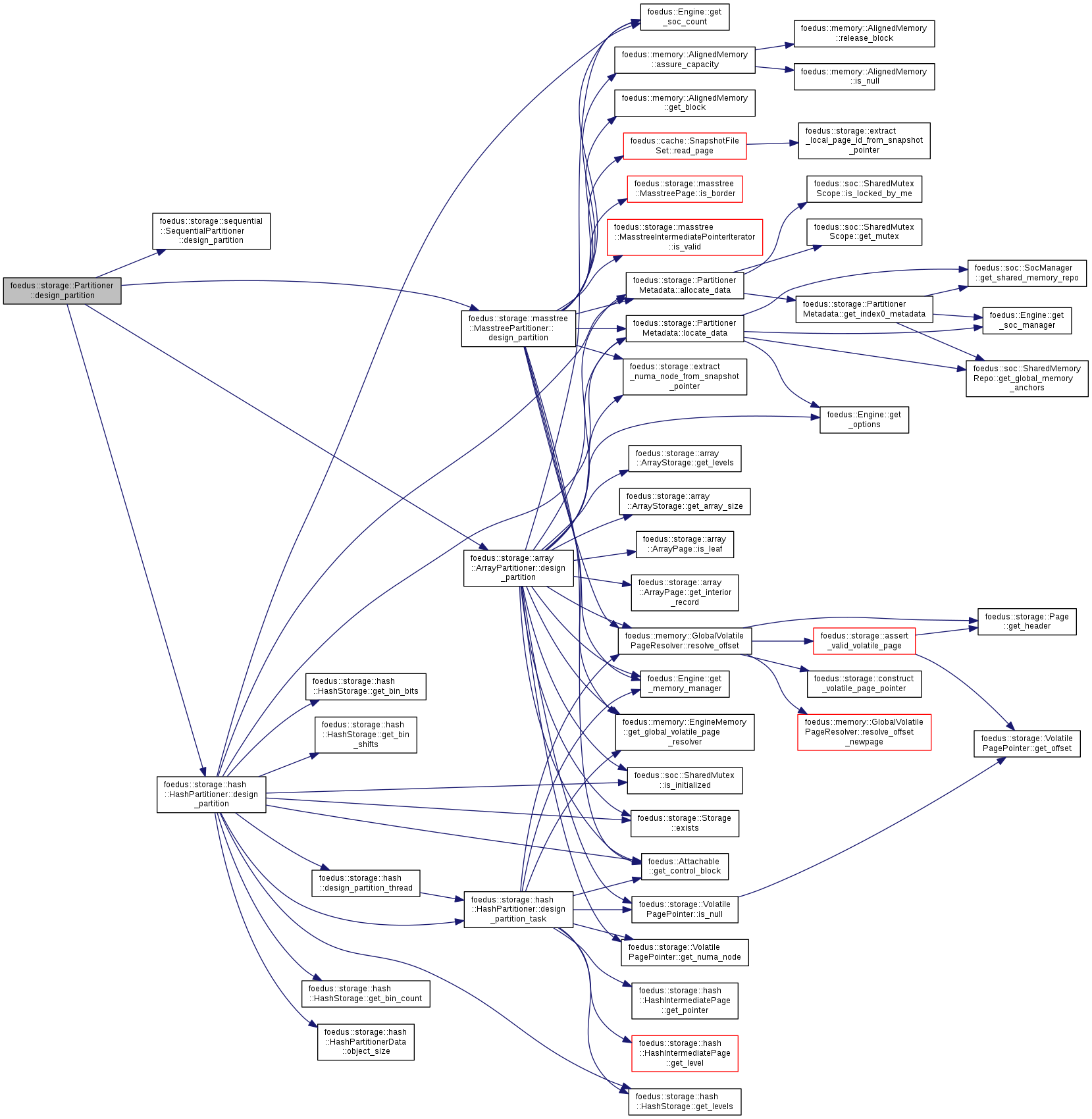
| const PartitionerMetadata & foedus::storage::Partitioner::get_metadata | ( | ) | const |
Returns tiny metadata of the partitioner in shared memory.
Definition at line 91 of file partitioner.cpp.
References foedus::Attachable< PartitionerMetadata >::control_block_.
|
inline |
Definition at line 86 of file partitioner.hpp.
|
inline |
Definition at line 87 of file partitioner.hpp.
| bool foedus::storage::Partitioner::is_partitionable | ( | ) |
returns if this storage is partitionable.
Some storage, such as a B-tree with only a single page (root=leaf), it is impossible to partition. In that case, this returns false to indicate that the caller can just assume all logs should be blindly sent to partition-0. Similarly, if there is only one NUMA node (partition), the caller also skips partitioning, but in that case the caller even skips instantiating partitioners.
Definition at line 94 of file partitioner.cpp.
References foedus::storage::sequential::SequentialPartitioner::is_partitionable(), foedus::storage::hash::HashPartitioner::is_partitionable(), foedus::storage::array::ArrayPartitioner::is_partitionable(), foedus::storage::masstree::MasstreePartitioner::is_partitionable(), foedus::storage::kArrayStorage, foedus::storage::kHashStorage, foedus::storage::kMasstreeStorage, and foedus::storage::kSequentialStorage.
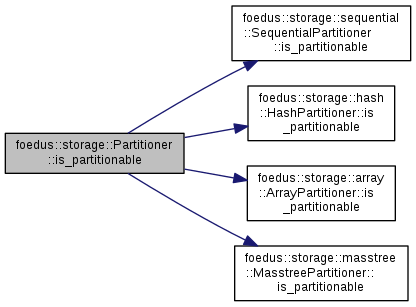
| bool foedus::storage::Partitioner::is_valid | ( | ) | const |
whether this object is ready for partitioning.
if only sorting is needed, it doesn't matter
Definition at line 92 of file partitioner.cpp.
References foedus::Attachable< PartitionerMetadata >::control_block_.
| void foedus::storage::Partitioner::partition_batch | ( | const PartitionBatchArguments & | args | ) |
Identifies the partition of each log record in a batched fashion.
Each storage type implements this method based on the statistics passed to create_partitioner(). For better performance, logs_count is usually at least thousands. Assume the scale when you optimize the implementation in derived classes.
Definition at line 118 of file partitioner.cpp.
References foedus::storage::kArrayStorage, foedus::storage::kHashStorage, foedus::storage::kMasstreeStorage, foedus::storage::kSequentialStorage, foedus::storage::sequential::SequentialPartitioner::partition_batch(), foedus::storage::hash::HashPartitioner::partition_batch(), foedus::storage::array::ArrayPartitioner::partition_batch(), and foedus::storage::masstree::MasstreePartitioner::partition_batch().
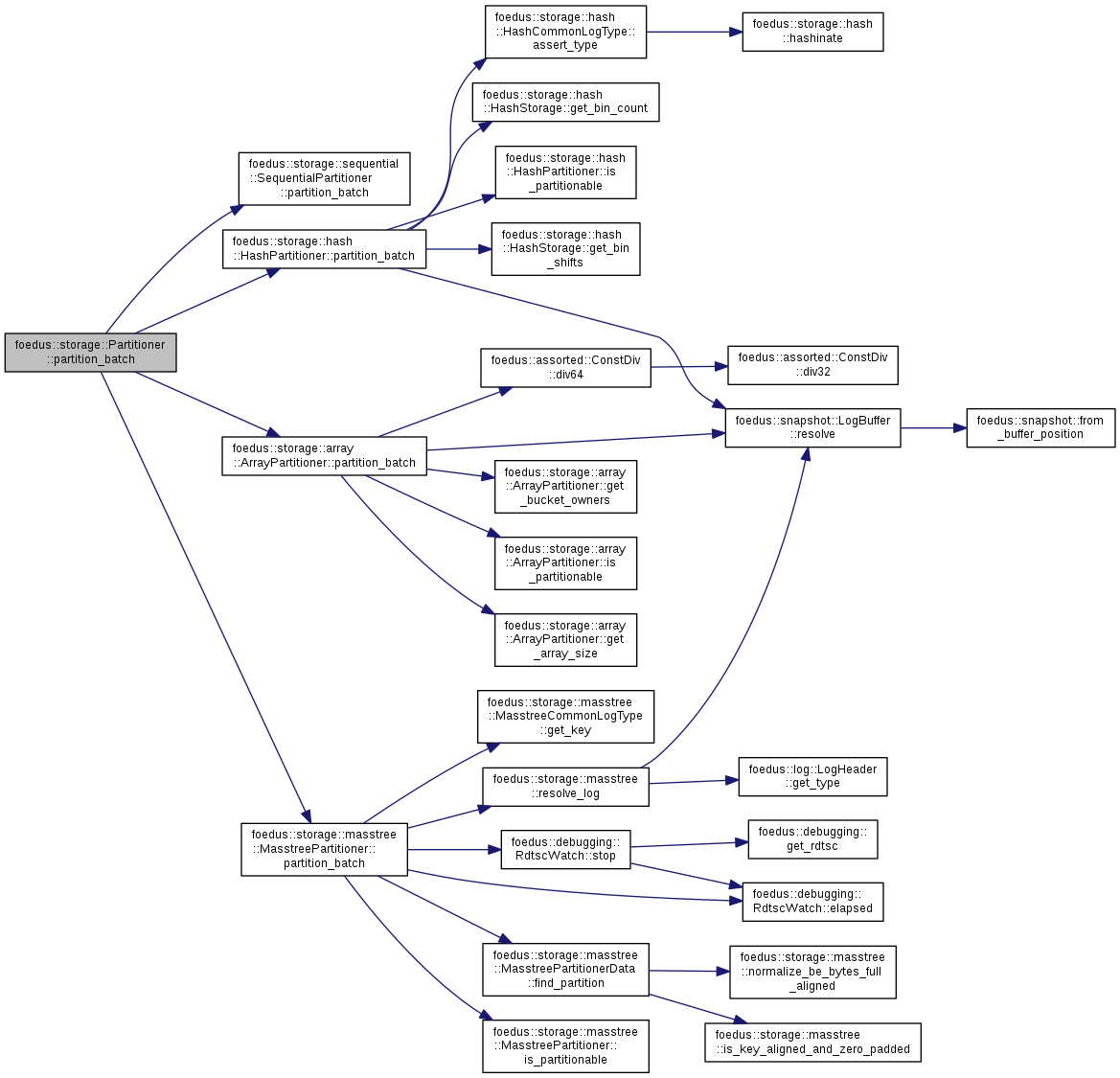
| void foedus::storage::Partitioner::sort_batch | ( | const SortBatchArguments & | args | ) |
Called from log reducer to sort log entries by keys.
All log entries passed to this method are for this storage. Each storage type implements an efficient and batched way of sorting all log entries by key-and-then-ordinal. The implementation can do compaction when it is safe. For example, two ovewrite logs on the same key's same data region can be compacted to one log. In that case, written_count becomes smaller than log_positions_count_.
Definition at line 129 of file partitioner.cpp.
References foedus::storage::kArrayStorage, foedus::storage::kHashStorage, foedus::storage::kMasstreeStorage, foedus::storage::kSequentialStorage, foedus::storage::sequential::SequentialPartitioner::sort_batch(), foedus::storage::hash::HashPartitioner::sort_batch(), foedus::storage::array::ArrayPartitioner::sort_batch(), and foedus::storage::masstree::MasstreePartitioner::sort_batch().
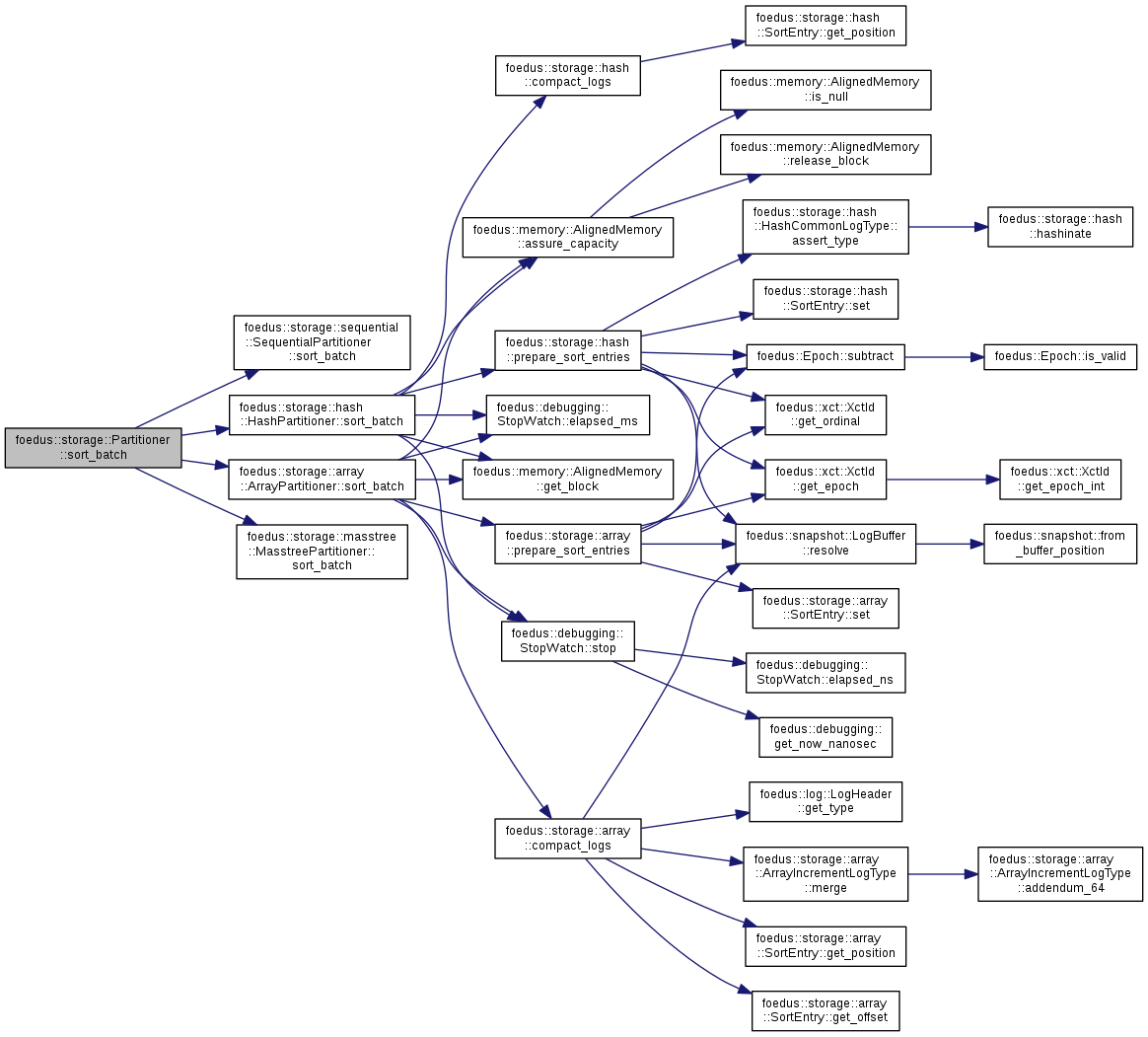
|
friend |
Definition at line 140 of file partitioner.cpp.